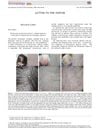 2 citations,
July 2018 in “Elsevier eBooks”
2 citations,
July 2018 in “Elsevier eBooks” Some supplements may help with hair loss, but there's not enough strong evidence to recommend them without doctor advice.
 January 2025 in “TURKDERM”
January 2025 in “TURKDERM” Alopecia areata incognito in children can be effectively treated with triamcinolone acetonide and supplements, leading to full hair regrowth.
 July 2021 in “Australasian Journal of Dermatology”
July 2021 in “Australasian Journal of Dermatology” The trichoscopy-assisted hair pull test is useful for diagnosing different types of hair loss.
 11 citations,
April 2015 in “International Journal of Cosmetic Science”
11 citations,
April 2015 in “International Journal of Cosmetic Science” Adenosine helps grow thicker hair in Japanese men with hair loss.
 90 citations,
July 2008 in “Dermatologic therapy”
90 citations,
July 2008 in “Dermatologic therapy” Lichen planopilaris is a chronic, scarring hair loss condition with no definitive cure, requiring accurate diagnosis and treatment to manage symptoms.
 61 citations,
July 2011 in “PLOS ONE”
61 citations,
July 2011 in “PLOS ONE” Spermidine may help reduce hair loss and deserves further testing as a treatment.
 58 citations,
November 2020 in “International Journal of Dermatology”
58 citations,
November 2020 in “International Journal of Dermatology” COVID-19 may cause a temporary hair loss condition called telogen effluvium in some patients after recovery.
 54 citations,
September 2012 in “Dermatologic Clinics”
54 citations,
September 2012 in “Dermatologic Clinics” Some medications can cause hair loss, but stopping the drug usually leads to recovery within 3 months.
 6 citations,
August 1991 in “Pediatric Clinics of North America”
6 citations,
August 1991 in “Pediatric Clinics of North America” The document concludes that various hair and scalp disorders in children have specific treatments and proper diagnosis is essential.
 December 2024 in “PubMed”
December 2024 in “PubMed” The supplement improved hair density and was safe to use.
 159 citations,
July 2006 in “Endocrine Reviews”
159 citations,
July 2006 in “Endocrine Reviews” Estrogens significantly influence hair growth by interacting with receptors in hair follicles and may help regulate the hair growth cycle.
 144 citations,
July 2002 in “Clinical and Experimental Dermatology”
144 citations,
July 2002 in “Clinical and Experimental Dermatology” Telogen effluvium is a common type of hair loss that can resolve on its own or become chronic, with treatment depending on early diagnosis.
 45 citations,
March 2003 in “Pediatrics”
45 citations,
March 2003 in “Pediatrics” Baby's toe injury linked to mom's hair loss; check baby's toes and be careful with fruit gel snacks.
 10 citations,
June 2021 in “BioMed Research International”
10 citations,
June 2021 in “BioMed Research International” Some recovered COVID-19 patients experience skin, hair, and nail issues, suggesting they need follow-up care.
 3 citations,
October 1988 in “Clinics in Dermatology”
3 citations,
October 1988 in “Clinics in Dermatology” Using 3% topical minoxidil can help women with hair loss, but more research is needed.
 1 citations,
May 2017 in “InTech eBooks”
1 citations,
May 2017 in “InTech eBooks” Telogen Effluvium is a common hair loss condition that can be short-term or long-lasting and is often caused by stress, illness, or nutritional issues.
 May 2024 in “Deleted Journal”
May 2024 in “Deleted Journal” Dutasteride effectively treats hair loss in men who don't respond to finasteride.
 51 citations,
November 2020 in “Journal of the European Academy of Dermatology and Venereology”
51 citations,
November 2020 in “Journal of the European Academy of Dermatology and Venereology” COVID-19 infection may cause significant hair loss, but full hair recovery is likely without special treatment.
 33 citations,
August 2016 in “Indian Journal of Dermatology, Venereology and Leprology”
33 citations,
August 2016 in “Indian Journal of Dermatology, Venereology and Leprology” Dutasteride is more effective than finasteride at increasing hair count and reversing hair thinning in men with hair loss, but both have similar side effects.
 24 citations,
September 2019 in “Journal of The American Academy of Dermatology”
24 citations,
September 2019 in “Journal of The American Academy of Dermatology” Low-dose oral minoxidil improved or stabilized hair loss in some patients, but higher doses may be needed for significant effects.
3 citations,
August 2022 in “International Journal of Molecular Sciences” COVID-19 can cause hair loss, and treatments like PRP and stem cells might help.
 November 2023 in “Clinical, Cosmetic and Investigational Dermatology”
November 2023 in “Clinical, Cosmetic and Investigational Dermatology” Saw palmetto extract reduced hair loss and improved hair growth in people with hair thinning.

COVID-19 infection is highly related to increased hair loss, especially in women.
 August 2019 in “Journal of The American Academy of Dermatology”
August 2019 in “Journal of The American Academy of Dermatology” RV3466F lotion significantly reduces hair loss and improves acute telogen effluvium.
 September 2015 in “British Journal of Dermatology”
September 2015 in “British Journal of Dermatology” Most clinicians follow discharge guidelines, many lupus patients don't use sunscreen regularly, dithranol is effective for psoriasis, biopsy methods should be based on lesion type, voriconazole may raise skin cancer risk, a new scale can help diagnose female hair loss early, and most melanomas may develop from existing moles.
 2 citations,
August 2022 in “JAAD case reports”
2 citations,
August 2022 in “JAAD case reports” COVID-19 vaccines may rarely worsen hair loss in people with severe alopecia, but the benefits of vaccination still outweigh this risk.
 3 citations,
January 2020 in “Annals of Dermatology”
3 citations,
January 2020 in “Annals of Dermatology” More atypical club hairs may indicate Telogen Effluvium.
1 citations,
May 2022 in “International Journal of Cosmetic Science” Edelweiss extract can increase hair density and promote hair growth.
 March 2023 in “International Journal of Biomedicine”
March 2023 in “International Journal of Biomedicine” Hair loss from Telogen Effluvium can be managed by treating the underlying cause and may improve with treatments like minoxidil.
 May 2024 in “Journal of cosmetic dermatology”
May 2024 in “Journal of cosmetic dermatology” A shampoo with caffeine and adenosine may help prevent hair loss and thicken hair.




























